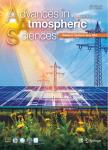Influence of Arctic Sea-ice Concentration on Extended-range Forecasting of Cold Events in East Asia
作者机构:CAS Key Laboratory of Regional Climate-Environment for Temperate East AsiaInstitute of Atmospheric PhysicsChinese Academy of SciencesBeijing 100029China Department of Atmospheric and Oceanic Sciences and Institute of Atmospheric SciencesFudan UniversityShanghai 200433China Innovation Center of Ocean and Atmosphere SystemZhuhai Fudan Innovation Research InstituteZhuhai 518057China CMA-FDU Joint Laboratory of Marine MeteorologyShanghai 200438China Yantai Vocational CollegeYantai 264043China State Key Laboratory of Severe WeatherChinese Academy of Meteorological SciencesBeijing 100081China State Key Laboratory of Tropical OceanographySouth China Sea Institute of OceanologyChinese Academy of SciencesGuangzhou 510301China Beijing Institute of Applied MeteorologyBeijing 100029China
出 版 物:《Advances in Atmospheric Sciences》 (大气科学进展(英文版))
年 卷 期:2023年第40卷第12期
页 面:2224-2241页
核心收录:
基 金:the National Natural Science Foundation of China(Grant Nos.42288101,41790475,42175051,and 42005046) the State Key Laboratory of Tropical Oceanography(South China Sea Institute of Oceanology,Chinese Academy of Sciences Grant No.LTO2109) the Guangdong Basic and Applied Basic Research Foundation(Grant No.2021A1515011868)
主 题:cold event Arctic sea-ice concentration extended-range prediction
摘 要:Utilizing the Community Atmosphere Model,version 4,the influence of Arctic sea-ice concentration(SIC)on the extended-range prediction of three simulated cold events(CEs)in East Asia is *** results show that the Arctic SIC is crucial for the extended-range prediction of CEs in East *** conditional nonlinear optimal perturbation approach is adopted to identify the optimal Arctic SIC perturbations with the largest influence on CE prediction on the extended-range time *** shows that the optimal SIC perturbations are more inclined to weaken the CEs and cause large prediction errors in the fourth pentad,as compared with random SIC perturbations under the same *** diagnosis reveals that the optimal SIC perturbations first modulate the local temperature through the diabatic process,and then influence the remote temperature by horizontal advection and vertical convection ***,the optimal SIC perturbations trigger a warming center in East Asia through the propagation of Rossby wave trains,leading to the largest prediction uncertainty of the CEs in the fourth *** results may provide scientific support for targeted observation of Arctic SIC to improve the extended-range CE prediction skill.



